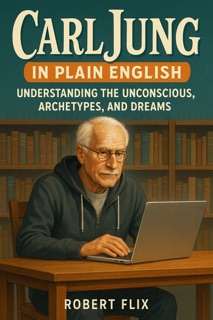Carl Jung helped invent modern depth psychology, then wrote about it in a way that makes most readers quietly back away from the bookshelf.
Carl Jung in Plain English: Understanding the Unconscious, Archetypes, and Dreams is what happens when someone sits down with Jung’s ideas, removes the fog, keeps the weirdness, and adds a dry sense of humor.
Inside, Jung stops being a distant bearded oracle and turns back into a working psychiatrist with a messy life, a stubborn mind, and an alarming number of inner conversations. You’ll follow him from Swiss childhood angst and his famous fallout with Freud to the visions that became The Red Book and the late works where he tries to systematize the chaos.
Along the way, the book walks through:
the unconscious as Jung actually meant it,
why the Shadow is more than “your dark side,”
archetypes without mystical hand-waving,
dreams as psychological commentary rather than fortune cookies,
individuation without pretending it’s a glamorous spiritual makeover,
and how all this ended up spawning things like personality tests, self-help clichés, and internet memes about “main character energy.”
There’s also a look at Jung’s neighbors and critics — Freud, Adler, Nietzsche, William James, Eastern traditions, New Age appropriation, modern neuroscience — not as sacred rivals, but as people having very different arguments about what a mind is.
The tone is simple without being childish, ironic without being dismissive, and respectful of Jung without treating him as a prophet. If you’re curious about Jung but allergic to dense prose, solemn mysticism, and Jungian name-dropping, this is a guided tour of the ruins and wonders of his psychological universe — with enough light on the path to see where you’re walking.







































